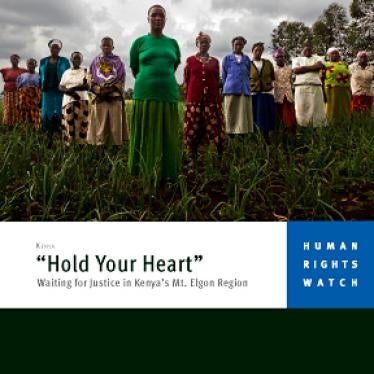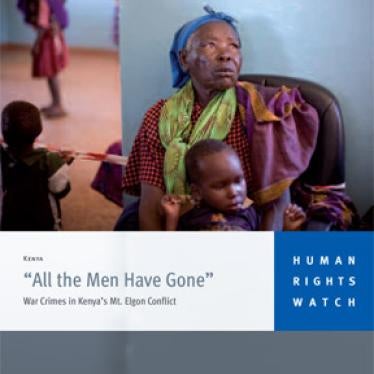(Bungoma, Kenya) – Eight residents of Kenya’s Mt. Elgon region, whose family members were forcibly disappeared during an internal armed conflict nearly four years ago, were finally able to file complaints with the Kenyan police on November 3, 2011, with the assistance of Human Rights Watch and Western Kenya Human Rights, a nongovernmental organization, Human Rights Watch said today.
The relatives of the eight residents were among at least 325 Kenyans who disappeared between 2006 and 2008. They were either abducted by the Sabaot Land Defense Forces (SLDF), a militia group, or arrested by the Kenyan military during Operation “Okoa Maisha,” a brutal joint military-police operation in 2008 to crack down on the militia.
During the operation in 2008, some residents tried to file complaints with the police but were turned away, while others were afraid to file complaints. After Human Rights Watch released a report on October 27, “‘Hold Your Heart’: Waiting for Justice in Kenya’s Mt. Elgon Region,” which highlighted the plight of the forcibly disappeared, victims’ families told Human Rights Watch and Western Kenya Human Rights that they still wanted to seek justice. The two organizations presented the report to victims in Mt. Elgon on November 3 and accompanied victims to Chesikaki police station, where police took their statements. However, members from the Kenyan military set up a roadblock on the road leading away from the station and illegally confiscated a tape from a journalist who had filmed the presentation.
“We are pleased that the Kenyan police received the victims and took their statements. The police now have a real opportunity to demonstrate that they can and will investigate these crimes thoroughly and impartially, even when the accused are members of the security forces,” said Daniel Bekele, Africa director at Human Rights Watch. “Unfortunately, the military’s attempt to harass a journalist who was simply documenting the victims’ quest for justice is inexplicable and indefensible.”
The new Human Rights Watch report called on President Mwai Kibaki to establish a commission of inquiry into the enforced disappearances and other human rights abuses during the conflict. Human Rights Watch also called on the International Criminal Court (ICC) to initiate investigations into over 1,000 killings and thousands of cases of torture, rape, and forcible displacement during the conflict and to prosecute those found to be most responsible if the Kenyan authorities are unwilling or unable to do so.
A prominent politician from Mt. Elgon told news media that he rejected the report, claiming that Mt. Elgon residents were ready to forgive one another and forget the past. But at the presentation of the report in Mt. Elgon, participants insisted on truth and justice. “Our family members were slaughtered – how can we forget,” said one participant. Another explained why she filed a complaint: “I want to know where my husband’s body is. My children continue to ask, ‘What happened to dad after the military took him?’ and I want to be able to give them an answer.”
The police in Chesikaki were initially hesitant to receive the victims, saying they did not have the authority to handle such complaints. One officer said the complaints were too old, while another said the complaints were too serious for officers of their level. Human Rights Watch contacted the provincial police chief, who instructed the local police to receive the victims and take their statements, and supplied additional police officers to help take statements. The officer in charge of Chesikaki station assured Human Rights Watch that he would follow up on victims’ complaints in conjunction with divisional police officials.
The cooperation by the police was not matched by the military, however. Soldiers set up a roadblock on the road from Chesikaki to Bungoma, stopped a journalist from Kenya Television Network (KTN) who had attended the report presentation and recorded interviews with victims, and confiscated one of his tapes.
“The security forces should not continue to cover up the atrocities that took place in Mt. Elgon nearly four years ago, to pretend that the victims do not exist,” Bekele said. “The victims have made their demands known, loud and clear – they still insist on truth and justice.”








